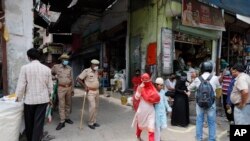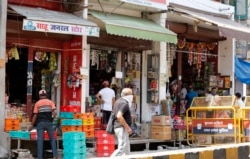A month after imposing a stringent lockdown, India on Saturday allowed neighborhood stores in cities and shops in rural areas to reopen in a bid to gradually get its shuttered economy back on track.
The move is expected to bring a measure of relief to the retail industry, which employs 35 million people and is the second-biggest provider of jobs, after agriculture.
Malls and restaurants, however, will remain closed, as will markets in coronavirus hot spot areas.
This is the second small step to resume normal life in the country of 1.3 billion that has been under the world’s biggest and most stringent lockdowns – earlier this week India allowed farm-based businesses and some factories in areas less affected by the coronavirus to resume operations.
The Ministry of Home Affairs, which made the announcement, said shops could reopen only with half staff, would have to maintain social distancing norms and would have to comply with new measures such as those requiring the wearing of masks and gloves.
The shutdown has virtually brought the economy to a standstill creating massive hardship for millions of people employed in its vast informal sector. According to the Center for Monitoring Indian Economy, a business information company, unemployment in the country has surged to about 25 percent during the lockdown period.
Only a few shop owners opened Saturday following the late-night order, and it may take time for people to venture out.
“I won’t be rushing out immediately to the market but just the thought that things are slowly getting back to normal made me feel so much better,” said Neema Eidnani, who lives near New Delhi.
India has recorded over 24,500 cases of the coronavirus and 775 deaths. Health authorities say that the rise of infections in the country “is linear and not exponential,” which according to officials, is as an indication that strategies adopted have succeeded in limiting it to a “particular level.”
"During the 30 days of lockdown, we have been able to cut transmission, minimize spread and increase the days of doubling of COVID-19,” according to C.K. Mishra, the Chairman of one of the 11 groups set up by Prime Minister Narendra Modi to deal with the health crisis said this week.
“We have been able to consistently ramp up testing and utilize our time preparing for the future in case the virus spreads further," he said.
That spike, health experts say, is inevitable, and they warn that even a limited opening will bring a flood of new infections, especially in a country where social distancing norms are hard to maintain in crowded cities, where most cases have been reported.
Imposed last month for three weeks, the lockdown has been extended till May 3, but it could remain in place even longer in the worst-hit areas such as Mumbai.






